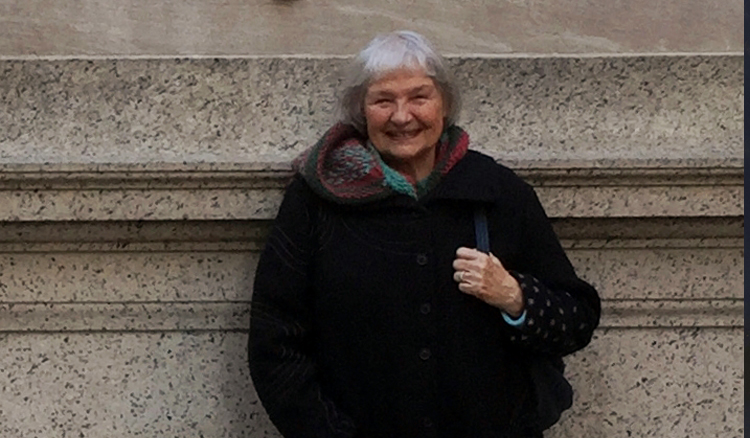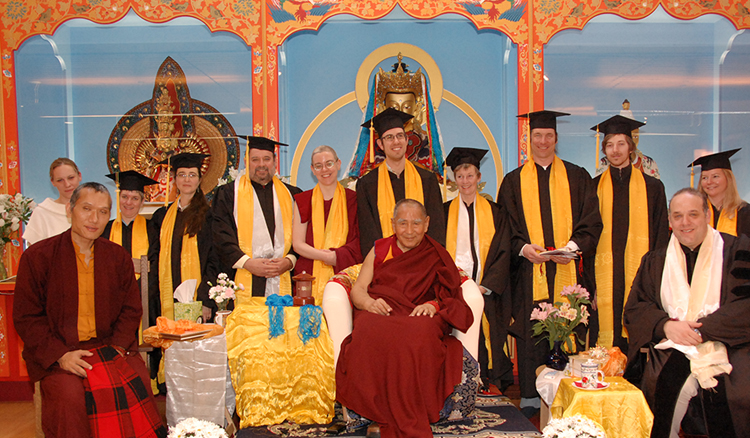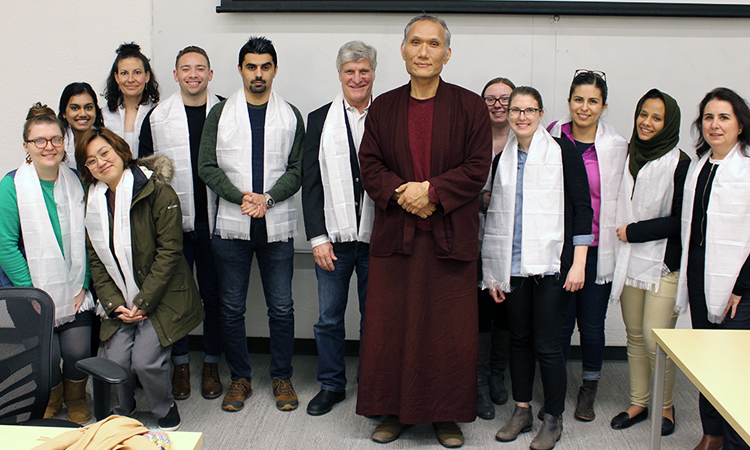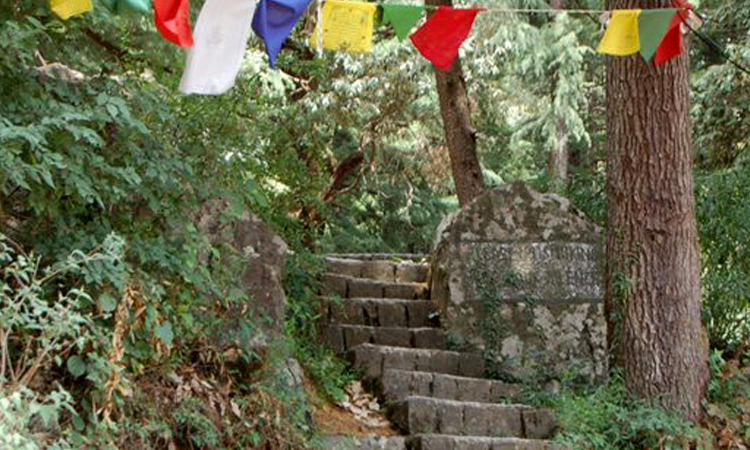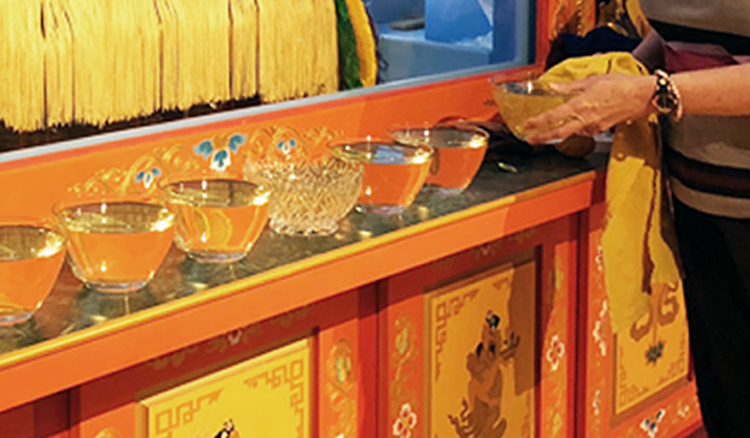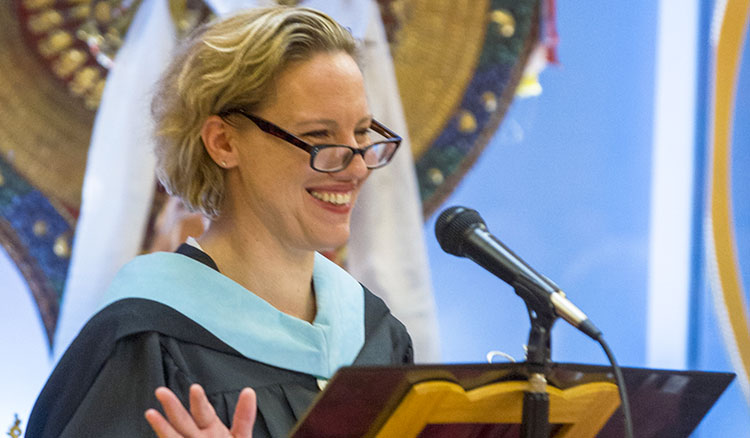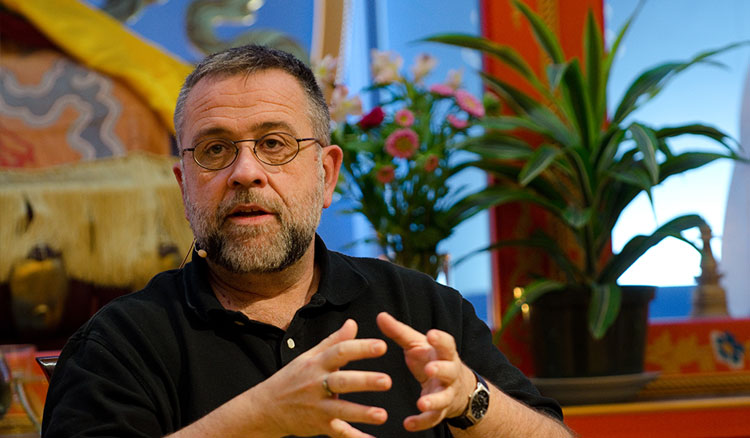by Leigh Miller, PhD, Director of Academic Programs, Maitripa College
Leigh Miller, PhD, Director of Programs at Maitripa College, chats with Mark Weidenaar, an advanced-standing MDiv student at Maitripa College, about his experience of Clinical Pastoral Education (CPE) and how his education at Maitripa College and the practice that has evolved from it facilitates his ability to serve others in the world.
On March 5, 2020, I enjoyed an hour of catching up with Mark Weidenaar, an advanced-standing MDiv student at Maitripa College, about his experience of Clinical Pastoral Education (CPE), a required educational curriculum of pastoral care for individuals preparing for professional chaplaincy, and recommended for anyone offering spiritual leadership. We reflected on ways that Mark’s Buddhist practice and his time at Maitripa College had uniquely prepared him for learning about himself and for doing engaged spiritual care in a local hospital. At the time we spoke, Mark had completed the first eight of twelve weeks of his first unit of CPE, which included a full-time curriculum of seminars, interpersonal cohort group work, and spiritual care visits with patients and their families, at a Level One Trauma hospital in Portland, Oregon. Mark started the CPE program unsure about his post-graduate calling, but by the end of the unit, he found himself applying to full-time CPE residency programs, the next step on the career path of professional chaplaincy. An even greater surprise for him, however, was, in his own words, “how much I drew on what I learned at Maitripa, every day,” and how clearly he is seeing that his meditation practice enables his ability to serve others well.
Mark Weidenaar (MW): CPE is a cycle of so much learning, reflection, putting into action, reflecting on that more… it’s really rewarding and meaningful, but also incredibly draining. I feel like I come home and I’m so tired, but at the same time, so satisfied.
Leigh Miller (LM): Where is the satisfaction coming from?
MW: Part of it is knowing that I’ve put in this effort over the last couple of years to cultivate compassion, patience, and equanimity, and I’m seeing that pay off in a very real way. People come up to me—fellow chaplains and my patients—and point this out to me. It really feels good to be seen like that, it is really satisfying and meaningful.
Just a couple of nights ago I was brought into a palliative care consult. The patient was expressing that he feels he is ready to die, ready to go on hospice, but his family, especially his wife, was not ready for that. Even the word “hospice” brought up a lot of sadness and anger and grief for her. So I was having to hold both of their feelings and perspectives at the same time. Although I personally align more with accepting death, accepting of hospice, accepting what is inevitably coming, I also know that a person’s grief process can’t be rushed. So, holding an open, non-judgmental space with the wife of the patient was really important and something that I could offer. The next day, one of the other staff chaplains visited with them, and afterwards that chaplain came to tell me that the patient had said to him that he’d felt extremely comfortable and grounded and at peace when I was there in the room with him—I wasn’t saying or doing much verbally, but internally I was active. I was maintaining an internal awareness of where am I right now?, noting this is suffering, and maintaining for them presence and grounded-ness.
I feel like that came across somehow to the patient.
LM: What specifically were you doing to sustain this presence, internally?
MW: Specifically, I was going to one of my anchor points—a place in the forest between two wise old trees where I feel completely held and supported, and I also thought of the Buddha’s teachings: this is samsara, suffering is ever-present. It is not something to be surprised about.
These two things were going on internally for me—awareness of the nature of samsara, and feeling this grounded calm place in my heart. I moved that peace down into my feet, and imagined spreading that out into the room to transform it into that setting where everyone could feel held and supported.
LM: Can you talk to me about how training in Buddhist meditation helps when one is doing the work of chaplaincy? How is meditation not just good, in general, for personal spiritual formation for people who work as chaplains, but can you make any specific links between certain kinds of meditation and certain kinds of spiritual care competencies? How does having a meditation practice connect to what you’re doing on a day-to-day basis in the hospital?
MW: It’s hard to overstate the centrality of meditation to the work that I do. I don’t know that I could do chaplain work without having a consistent meditation practice.
One specific aspect of that is the ability to come back to the anchor point or the breath or whatever one is using as the object of meditation—to be able to come back to that is important. When I have a strong feeling, or get triggered, or the other person has a strong emotion, I try to use my anchor point to check in on myself. It’s been valuable to do this because it allows me to ascertain if what is coming up is pointing to something useful for the spiritual care session right now, or not. If I didn’t have this mindfulness practice, I wonder, would that go by the wayside, unseen?
For example, I had a patient the other day who was transitioning to comfort care [when dying is imminent], who expressed doubts about whether he had been a good enough person in his life. He said, “I mean, I don’t speak out against the gays and the blacks…” Immediately, there was a rush of anger and judgement of racism in me, but because it was so strong, I was able to use that as a touchstone to ask ‘why is this arising so strongly in me? And, can I attend to the patient’s needs right now and then attend to my own needs after this session?’ Then I could turn my attention back to hearing that he was worried about dying.
Later in the visit, I had to talk to his wife on the phone. She asked me to pray for the salvation of the nurse’s soul, because the nurse had said he was not Christian. So that, again, brought up a lot of stuff for me. Afterwards, I wrote up this visit as a Verbatim to share with my CPE cohort, and received a lot of feedback to help me understand my own responses.
So, as an example of a way I was able to use my mindfulness practice, I’d say whenever a strong feeling arises, I can relate to it—to not let it go unnoticed, to know it is an impermanent thought or feeling, and to make a mental note that there’s something there to come back to—and also stay connected to caring for the patient for the duration of the visit.
I’ve noticed too, in my cohort, that they are all wanting to work on this mindfulness, too; wanting to bring more awareness to the internal dialogues happening while they are working with patients. And I feel like this is something I’ve been able to offer through sharing and describing my own process. It feels good to be seen as beneficial to my patients and cohort, and to be seen as sharing useful practices from my Buddhist tradition in some way.
Also, when I’ve seen really deep suffering, someone in really deep spiritual despair, I do feel and I can offer empathy, but I also have this inner smile going on. An, ‘oh, I see…’. I see this is just suffering. There’s a deep feeling of recognition that this is where we are at, that you are suffering and this is samsara. I’m attuning to where they are (don’t worry, I’m not outwardly smiling while they are upset!) but inwardly I remember, in Buddhist iconography, that slight smile on the Buddha’s face, there’s some feeling of equanimity there. And this has been surprising.
Also, I use LaShelle’s class, in which we learned the specific skills of guessing feelings and needs, every day. It is amazing how healing this is for people, how simple a practice it is, but how healing it is. And it just reminds me of how many people go through their lives not ever being seen like that, not ever having someone truly care and take the time to figure out how they are doing. I’m so grateful for this NVC [nonviolent communication] practice.[i] It’s been lifechanging for myself, and, I feel, for the people I serve.
LM: What kind of responses do you see in people when they are seen and heard in this way?
MW: Just the other day, I joined a family preparing for a man’s death. The man was planning to donate his organs and he was very clear about his wishes that his own demise be of use for others, but his family was having a hard time and had spent the whole day with the organ donation team. Some of the relatives wanted his body to be whole to return to God. The organ donation team was just trying to listen, but nothing was really shifting. I went in at the start of my shift to orient them to what spiritual care is and to let them know I’d be there and available all night. One of the man’s sisters started talking to me about their difficulties with this, and I said, “Do you feel sad because you need some recognition around this process, all the hard work you are doing and the time you are putting in to serve this family?” She just dropped into her chair and said, “No one has ever asked me that before. I feel seen right now. No one ever asks me how I’m doing. Thank you so much.”
Mark and I talked about his recent vacation, and how he looked it in terms of self-care that not only helped him but also helped his work.
MW: I spent four days unplugging in nature, having fun with friends, rock climbing, enjoying all these activities with my wife, and I came back to the hospital feeling invigorated and creative. It helps me recognize how important self-care really will be for the long term; several days of doing what is nourishing for me, helps me know what those things are that really make me resourced.
LM: I appreciate how you express self-care as not merely a requisite break to keep one from the verge of collapse, but with a sense of joy and vitality, both in what you enjoyed and what you bring back with you.
MW: And I get joy and vitality from my meditation practice, too, especially when I can do it deeply and have time for that as a strong foundation. During periods of stronger practice in my life, I can see the direct consequences. It really shows up in how well I am able to serve others and to be with myself. It’s not worth it to give it up. It was ok to be a bit slack about practice sometimes while I was in school because I wasn’t being counted on by others, but now that I am, I can see it’s essential on a near daily basis. Nowadays I am so physically exhausted after a day of CPE that it can be hard to sit for five minutes, but I am maintaining a bare minimum of practice several days a week.
I had a long visit with a man in the burn unit, who’d had a lot of trauma and challenge with his family, and then we got to talking about his spirituality, and he said, ‘I just love to get out in nature, and with the trees’. I spontaneously said, ‘Do you ever just lay flat on the ground, with your face in the earth?” He said, no, he hasn’t tried that yet, but looked forward to when he could. “That’s one of the most grounding practices I have even known!’, I told him. He said I love to go put my feet in the river and hug the trees and especially the cedars. In this conversation with him, I really felt authentically alive and myself. And it felt like one of the best patient visits I’ve had yet. I felt ‘here’s a guy who’s been burned, so he wants that cooling sanctuary’. So that’s why I offered this piece of myself. I am going to go see him tomorrow, and have some cedar needles to bring him.
So I think overall the meditation practice and my time here at Maitripa has prepared me so well for this work, and I am so grateful for it. And I definitely didn’t see, during the time I was in coursework here, what was happening, but now with some hindsight, I can say wow, these really are skills that I am cultivating and nourishing, and the fruits are starting to show up a little bit, and it’s a really good feeling.
[i] LaShelle Lowe-Charde is a Nonviolent Communication trainer and therapist, and teaches Mindful Compassionate Dialogue at Maitripa College

